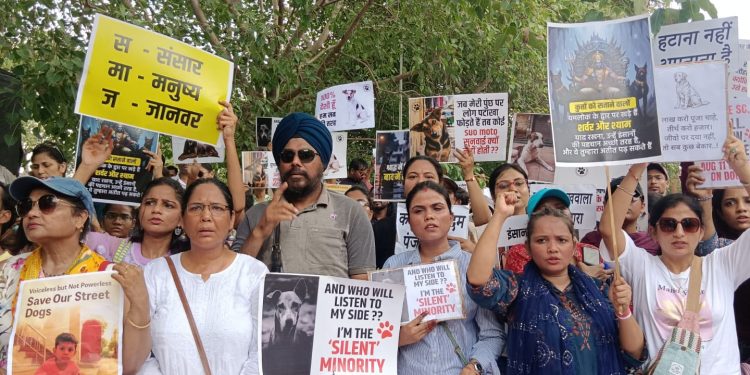New Delhi, August 22, 2025 — The Supreme Court on Friday revised its earlier directive on stray dog management in Delhi-NCR, allowing sterilised, vaccinated, and dewormed dogs to be released back into their original localities.
The three-judge special bench, led by Justice Vikram Nath and comprising Justices Sandeep Mehta and N V Anjaria, described the earlier blanket prohibition on release as “too harsh”. The court clarified that rabid and aggressive dogs would continue to be kept in shelters, while municipal bodies must maintain aggressive sterilisation drives to reduce stray populations.
Deposits by NGOs and Dog Lovers
In a significant move, the Court required individuals and NGOs opposing the August 11 order to deposit money before being heard further:
₹25,000 by individual dog lovers
₹2 lakh by NGOs
The amounts must be paid within seven days to the Court registry and will be utilised for building stray dog infrastructure under the supervision of municipal bodies.
“Failing which, they shall not be allowed to appear in the matter any further,” the bench warned.
Adoption of Stray Dogs Permitted
The bench allowed dog lovers to formally adopt strays through municipal bodies. Once adopted, the canines must be tagged and permanently kept off the streets.
“It shall be the responsibility of the applicant to ensure that the adopted stray dogs do not return to the streets,” the order said.
Sterilisation and Vaccination Emphasised
The Court stressed that aggressive sterilisation is the most effective way to curb the rising stray dog population.
Towns like Dehradun and Lucknow, which implemented sterilisation as per the Animal Birth Control (ABC) Rules, saw a steady decline in stray populations.
The bench also referred to chemical castration as a potentially safe and painless alternative method of sterilisation.
The Court acknowledged, however, that such intensive sterilisation was only possible in an “idealistic situation”, which may be difficult to achieve in Delhi-NCR.
Balancing Rights and Safety
At the heart of the case lies a sensitive balance — the right of stray dogs to live on the streets versus the safety of citizens, particularly children and elderly people, vulnerable to dog bites and rabies.
The Court noted that rabies infections are often fatal and must be treated as a grave public health risk.
What’s next is the implementation test: municipal bodies across Delhi-NCR must now roll out aggressive sterilisation and vaccination drives, create designated feeding zones, and ensure shelters are prepared to house aggressive or rabid dogs. NGOs and dog lovers who wish to remain part of the proceedings will have to deposit the required sums, while those seeking to adopt must formally take responsibility for keeping strays off the streets. At the same time, the Court is expected to work toward framing a uniform national policy on stray dog management, making this ruling a potential template for other states.







Discussion about this post